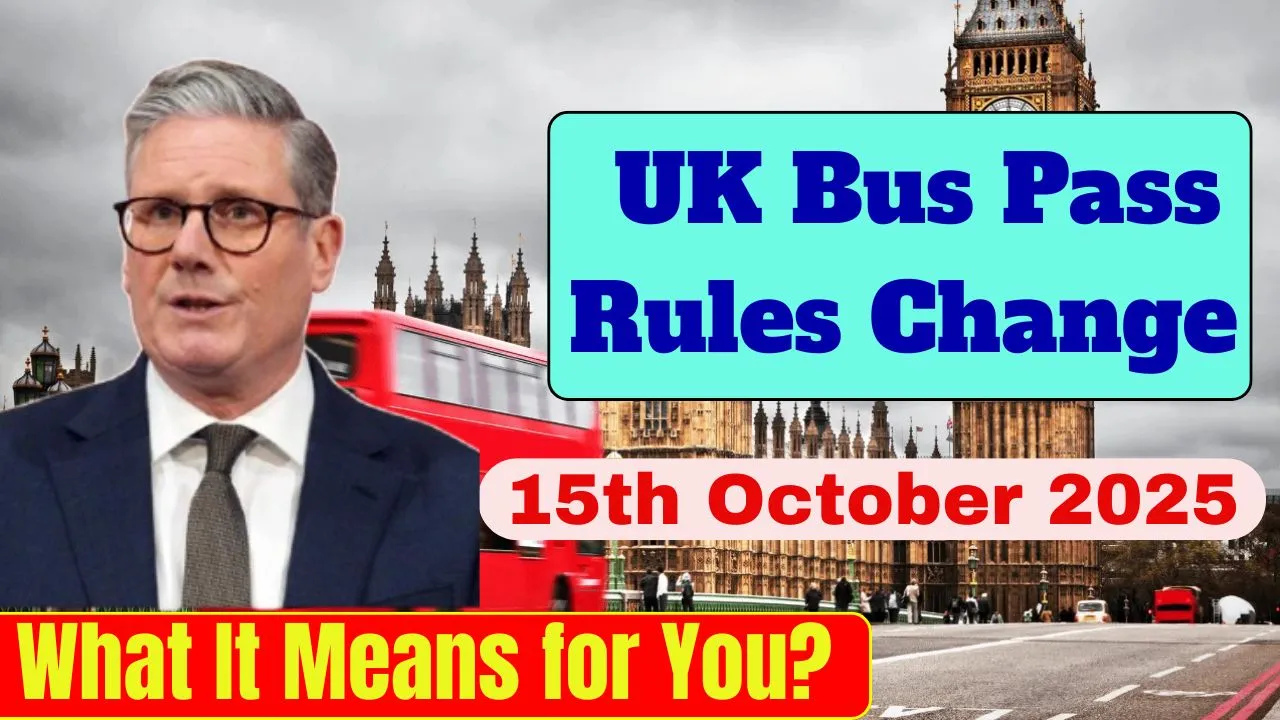The UK Bus Pass Rules Change coming into effect in October 2025 is set to reshape who qualifies for free local bus travel in England. If you’re nearing your 60s or even just planning your retirement years, these updates might affect your travel plans and budget more than you expect.
In this post, we’ll walk you through the UK Bus Pass Rules Change. What’s shifting, who loses out, who still qualifies, and what steps you need to take now to make sure you don’t lose access to concessionary travel. The goal is to make the updates clear, practical, and relevant to your everyday life.
What is the UK Bus Pass Rules Change and Why It Matters
The UK Bus Pass Rules Change is a major policy update affecting eligibility for free bus travel in England. From 15 October 2025, the age at which many people qualify for a free bus pass will align with the State Pension age, rather than staying fixed at 60 as it was in many local areas. This means fewer people will be able to access free bus travel as early as before, especially those aged 60–65.
This shift matters because it affects how older adults plan their transport, access healthcare, social events, or even work. For many, the pass is not just a benefit—it’s a lifeline. Understanding these new rules is essential if you rely on buses or expect to apply for a concessionary pass soon.
UK Bus Pass Rules Change: Key Changes You Should Know
Why the Changes Are Happening
The government says that rising costs, an ageing population, and the budget strain on local transport subsidies make reform necessary. Linking free bus pass eligibility to the State Pension age is one way they’re trying to make the system more fiscally sustainable.
Critics argue that this change unfairly burdens older people who rely on public transport, especially those with low income or in rural areas. Removing earlier access can raise travel costs, isolate communities, and reduce mobility for many.
Also, higher pension ages are already on the horizon. From 2026, England will raise the State Pension age to 67. That means many people who turn 66 after that point might not receive free bus travel until 67.
Who Is Most Impacted
- People between age 60 and State Pension age in England will feel the biggest hit—they’ll have to wait longer for free travel.
- Residents in Scotland, Wales, and Northern Ireland may feel less impact because their eligibility largely remains at 60.
- Those with disabilities, mobility challenges, or medical conditions will need to ensure their supporting documentation is up to date.
- People living near England’s borders may face confusion if schemes differ across council or national lines.
What Still Remains the Same
- Concessionary travel for local buses under the English National Concessionary Travel Scheme (ENCTS) still operates, although rules are stricter.
- Disability and health‑based passes remain valid routes, so age alone will not block you if you meet the qualifying criteria.
- Travel outside peak times (starting after ~09:30 on weekdays) continues to be the norm for free pass validity in most cases.
- Local councils retain authority to enhance or extend pass hours, add local benefits, or support earlier eligibility with their own funds.
What You Must Do Right Now
- Check your local council’s bus pass policy
Councils publish their specific scheme rules online—look for “concessionary travel” or “bus pass eligibility.” - Confirm your own eligibility timeline
If you were expecting to receive a free bus pass at age 60, you may now only qualify once you reach State Pension age. - Gather proof and documentation early
You’ll likely need proof of age, proof of address, and possibly medical evidence for health‑based passes. - Apply or reapply in advance
Many councils allow you to apply a few months before you hit the new qualifying age. - Stay alert for renewals and rechecks
Passes might expire more often, and you’ll need to revalidate eligibility more strictly. - Explore local supplementary schemes
Some councils may continue to offer passes at age 60 (or between 60 and pension age) using local funding—so check if yours does.
Regional Differences to Be Aware Of
In Scotland, Wales, and Northern Ireland, eligibility for free bus passes typically remains at age 60. The 2025 changes don’t override those existing national schemes.
In England, the shift is more drastic: free pass eligibility now hinges on State Pension age, which itself is rising.
In London, the rules are a hybrid. Londoners may qualify for certain travel benefits as early as 60 (e.g. via the 60+ Oyster card or Older Person’s Freedom Pass), but national free bus pass rules bundle under the ENCTS for areas outside London.
Final Thoughts
The UK Bus Pass Rules Change in October 2025 marks a big shift—especially for those between ages 60 and the State Pension age in England. The change places stricter eligibility rules and documentation demands, but it also attempts to preserve the system’s sustainability.
If you’re affected by these updates, start now: review your local council’s scheme, collect your documents, and apply before it’s too late. Feel free to comment below with your area or council name if you want help checking your specific rules. And if you’d like a comparison with train concessions, tram passes, or how these changes stack up in Scotland or Wales, just say the word.
FAQs
No. If your pass is still valid under current rules and you meet your council’s criteria, it should continue. But when it comes time to renew, you might face tougher eligibility checks.
You should still qualify under disability or medical criteria, though councils may ask for more up‑to‑date proof.
Yes, some councils may continue offering passes earlier using local budgets—ask your local authority for their scheme.
No. The free pass rules typically apply to local bus services only, not intercity coaches or private express buses.
The State Pension age in England is set to increase to 67 beginning in 2026, which will also shift the point at which bus pass eligibility begins.







